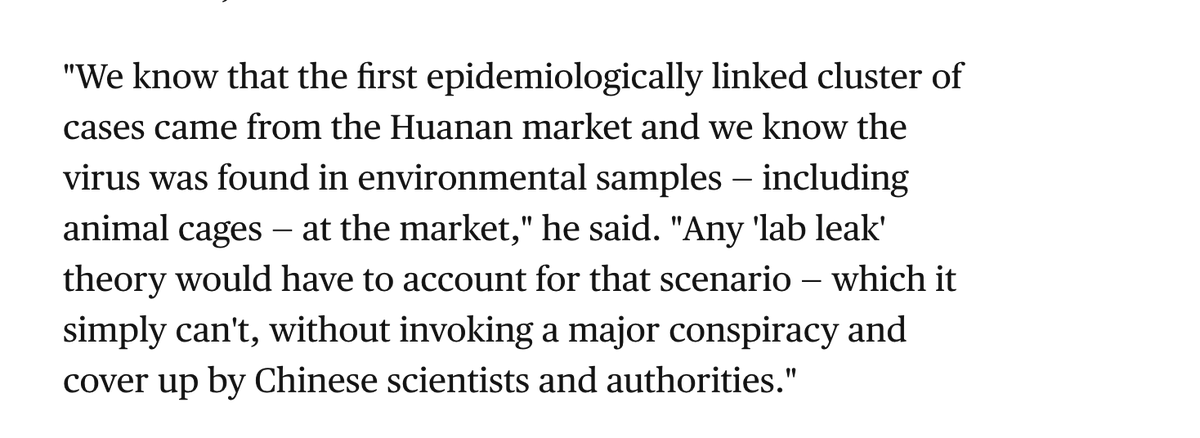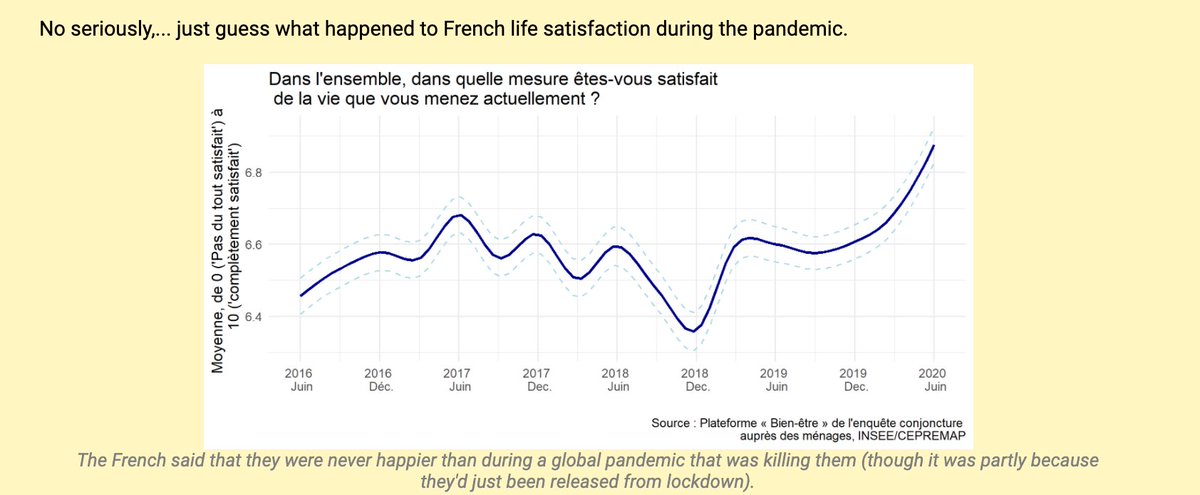
This article is bad. cbsnews.com/news/coronavir…
It conflates "created in a lab" with "escaped from a lab." Those are very different things.
This comment is idiotic:
It conflates "created in a lab" with "escaped from a lab." Those are very different things.
This comment is idiotic:

The problem is with Anderson's reading comprehension skills, not Redfield's grasp of evolutionary virology. Lipkin's defensiveness, and Anderson's, are dismaying. 

The lab-leak hypothesis is supported by roughly the same evidence as the no-lab-leak hypothesis, which is to say, almost none, and certainly not enough to be this confident. And this quote? Just kill me now. 

Someone who thinks "a major conspiracy and cover-up by Chinese scientists and authorities" is just *completely unfathomable* is not ready to be my go-to source on viral epistemology.
Worse still: Saying, "Shut up and don't talk about it," using this kind of blackmail:
Worse still: Saying, "Shut up and don't talk about it," using this kind of blackmail:

It's true that I can't see a thing Redfield added to the debate. It's true that there is no lower boundary on human stupidity and thus authority figures of any kind, past or present, should talk very, very slowly, using only simple words, lest some moron misunderstand,
and conclude the words, "I still think the most likely etiology of this pathogen in Wuhan was from a laboratory" actually mean, "Get yourself an AR on the double quicktime and shoot up a massage parlor."
(I would once have said, "No one is that stupid," but I recant that view.)
(I would once have said, "No one is that stupid," but I recant that view.)
But among adults--people who read newspapers and such--surely we can still speak like adults? Of course it matters where this thing came from, and of course the lab leak hypothesis is plausible. Not proven, but plausible.
It isn't "finger-pointing" to wonder just how, exactly, a disease that's killed nearly three million people, wiped $16 trillion from the global economy and kept the world under house arrest for a year came into being.
It might help us avoid this happening again, you see.
It might help us avoid this happening again, you see.
(That's our *special* human attribute, the one that's made us so successful, as a species. We're able to look at problems that threaten our survival, use complex, abstract speech to communicate with other members of our species, and solve these problems.)
We're better at this than bats are, though they won this round. And ... that's sort of the scientific spirit, isn't it? "How did this happen? Where did this come from? If it's a problem, how do we fix it?" "What might we do with fire?" "How about a wheel?"
That the virus doesn't bear the genetic signature of something humans might make clearly does *not* mean no one would ever dream of bringing it to a lab to have a little look-see. And any working scientist will tell you ... accidents happen.
That Chinese authorities have said, "Nope, not our lab," does *not* mean, "Phew, that's good thing. We can cross that one off the list."
The genetic evidence of a lab leak would look a lot like the genetic evidence that someone played with a bat and then travelled to Wuhan.
The genetic evidence of a lab leak would look a lot like the genetic evidence that someone played with a bat and then travelled to Wuhan.
Lipkin and Anderson really don't inspire confidence. They seem to view the question as a matter of partisanship, or pride, rather than science; they seem to find it more important to vituperate Redfield than to explain why they think he's wrong--
or even to pretend to understand what he said.
I get the impulse: "The people are too dumb to understand." But what happens if we dumb public discourse down so much that we lose the ability to discuss *anything* like adults? It can't be good for our long-term survival.
I get the impulse: "The people are too dumb to understand." But what happens if we dumb public discourse down so much that we lose the ability to discuss *anything* like adults? It can't be good for our long-term survival.
And what about the vast number of people who understand exactly enough to realize that Lipkin and Anderson sound very defensive, and very partisan, and not really like scientists are supposed to sound? What does that do to their confidence in the whole scientific enterprise?
That was a rhetorical question. You know the answer.
• • •
Missing some Tweet in this thread? You can try to
force a refresh




